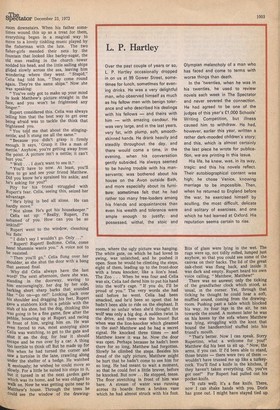L. P. Hartley
Over the past couple of years or so, L. P. Hartley occasionally dropped in on us at 99 Gower Street, sometimes for lunch, sometimes for evening drinks. He was a very delightful man, who observed himself as much as his fellow men with benign tolerance and who described his dealings with his fellows — and theirs with him — with amazing candour. He was very large, and in the last years, very fat, with plump, soft, smoothskinned hands. He drank heavily and steadily throughout the day, and there would come a time, in the evening, when his conversation gently subsided. He always seemed to be having trouble with his menservants; was bothered about his house on the Avon outside Bath, and more especially about its furniture; sometimes felt that he had rather too many free-loaders among his friends and acquaintances than even his wealth and tolerance were ample enough to justify; and possessed, withal, the stoic and Olympian melancholy of a man who has faced and come to terms with worse things than death.
In the 'twenties, when he was in his twenties, he used to review novels each week in The Spectator and never severed the connection. He had agreed to be one of the judges of this year's £1,000 Schools' Writing Competition, but illness caused him to withdraw. He had, however, earlier this year, written a rather dark-mooded children's story; and this, which is almost certainly the last piece he wrote for publication, we are printing in this issue.
His life, he knew, was, in its way, tragic: and this his novels reflect. Their autobiographical content was high; he chose Venice, knowing marriage to be impossible. Then, when he returned to England before the war, he exercised himself by sculling, the most difficult, delicate and solitary of exercises, and one which he had learned at Oxford. His reputation seems certain to rise.










































 Previous page
Previous page